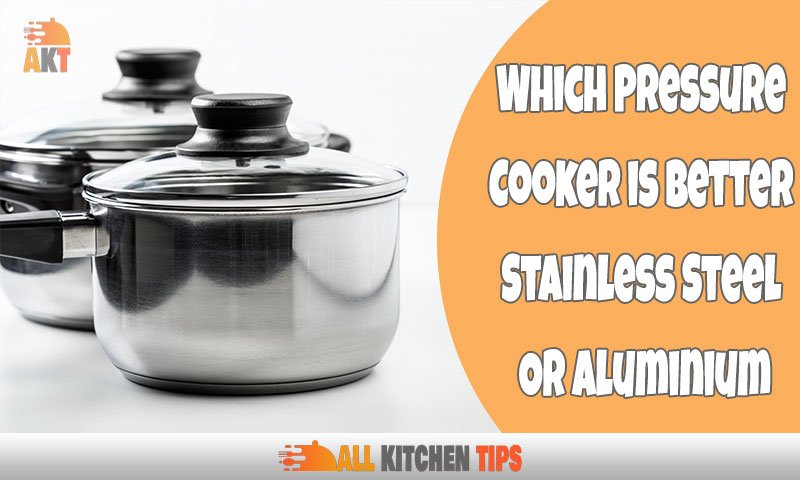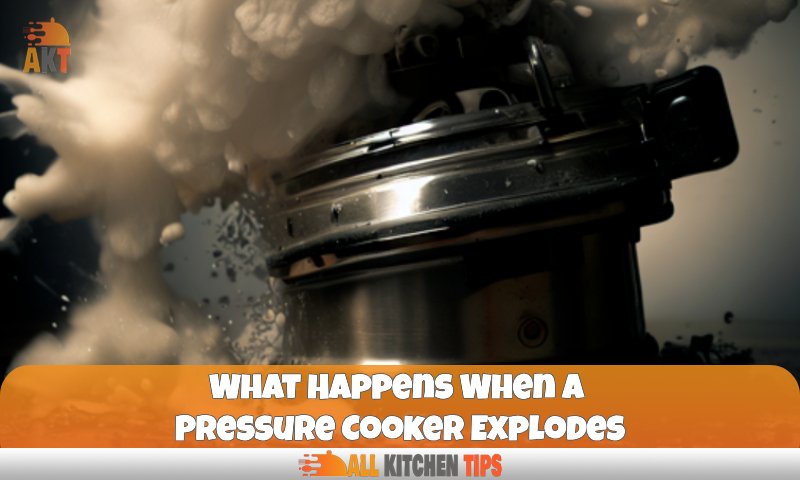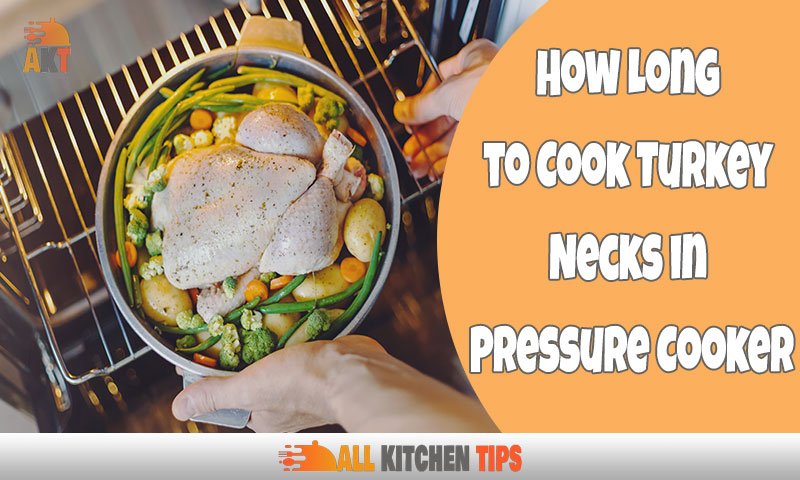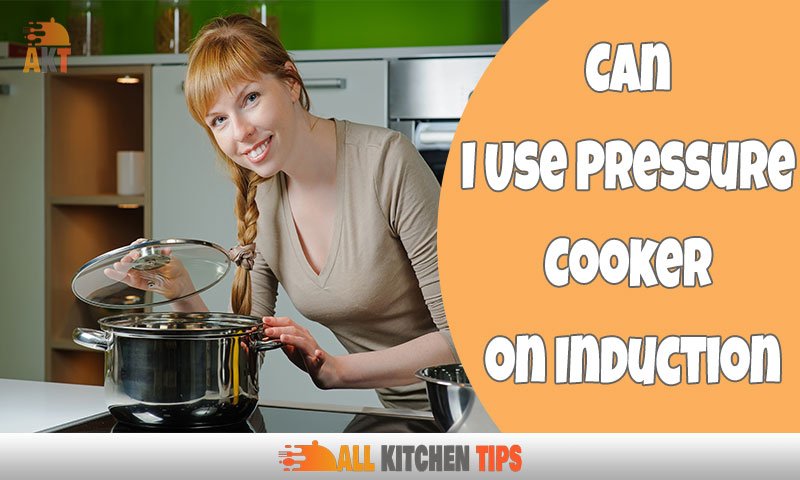Stainless steel pressure cookers are better than aluminum pressure cookers due to their durability and safety features. Pressure cookers have been a popular kitchen appliance for decades.
They are designed to cook food quickly, easily, and efficiently. Today’s pressure cookers come in various materials, ranging from aluminum to stainless steel. However, stainless steel and aluminum are the most common materials used in their manufacturing. Both of these materials have advantages and disadvantages.
The decision of which one to go for depends on your personal preference and cooking needs. In this article, we will discuss the pros and cons of both stainless steel and aluminum pressure cookers to help you make an informed decision.
Stainless Steel Pressure Cooker
Stainless Steel Pressure Cooker
Which Pressure Cooker Is Better: Stainless Steel Or Aluminium?
Pressure cookers have been around for many years now, and with the advancements in technology, they have become incredibly efficient and safe to use. When it comes to choosing the right material for a pressure cooker, however, the debate between stainless steel and aluminium is ongoing.
In this blog post, we will explore the benefits of using a stainless steel pressure cooker over an aluminium one.
Benefits Of Using A Stainless Steel Pressure Cooker
Stainless steel pressure cookers have several benefits over their aluminium counterparts, such as:
- Durability
- Ease of maintenance
- Superior cooking performance
Durability Of Stainless Steel Pressure Cookers
One of the biggest advantages of a stainless steel pressure cooker is its durability. These cookers are made of high-quality stainless steel material, which is resistant to heat, corrosion, and rust. Compared to aluminium pressure cookers, stainless steel pressure cookers are more robust and long-lasting, making them a better investment in the long run.
Ease Of Maintenance
Stainless steel is effortless to clean and maintain. You can easily wipe off any stains or residue from the surface with a wet cloth, and you don’t need to use harsh chemicals or scrub too hard. This ease of maintenance is another reason why many people prefer stainless steel pressure cookers over aluminium ones.
Comparison With Aluminium Pressure Cookers
When compared to aluminium cookers, there are several additional benefits to using a stainless steel pressure cooker. For example, stainless steel pressure cookers are:
- More scratch-resistant
- Non-reactive
- Non-porous
- Heavier, which ensures even heat distribution
Why Stainless Steel Pressure Cookers Are Better Than Aluminium Ones?
A stainless steel pressure cooker is a better investment than an aluminium pressure cooker due to its durability, ease of maintenance, and superior cooking performance. Stainless steel is long-lasting, easy to clean, and resistant to corrosion and rust, making it a great choice for those who want a reliable and efficient pressure cooker.
If you are looking for a pressure cooker that will last you a long time, then a stainless steel one should be your go-to choice.
Aluminium Pressure Cooker
Aluminium Pressure Cooker
Are Aluminium Pressure Cookers Worth Choosing Over Stainless Steel?
If you are looking to buy a pressure cooker, you may have stumbled upon the debate between aluminium and stainless steel. Both materials have their advantages and disadvantages, and the choice ultimately depends on your needs and preferences. This section will focus on aluminium pressure cookers, outlining their key features, benefits, and drawbacks to help you make an informed decision.
Why Choose An Aluminium Pressure Cooker
Aluminium pressure cookers are a popular choice among home chefs and professionals alike for several reasons:
- Lightweight and easy to handle: Aluminium is a lightweight metal that is easy to lift and move around. This makes it ideal for those who have difficulty lifting heavy objects or prefer a more effortless cooking experience.
- Affordable: Aluminium is cheaper than stainless steel, which means that aluminium pressure cookers are usually more budget-friendly.
- Excellent heat conductor: Aluminium conducts heat better than most materials, making it ideal for cooking dishes that require quick and even heating.
- Faster cooking time: Thanks to its superior heat conductivity, an aluminium pressure cooker can cook food faster than other materials. This saves time and energy in the kitchen.
Heating Efficiency
The heating efficiency of an aluminium pressure cooker is its most prominent feature. Here is how it works:
- Aluminium heats up faster than stainless steel, which means that the pressure cooker reaches the desired temperature quicker.
- Aluminium distributes heat evenly across the pot, ensuring that all parts of the food are cooked at the same rate. This means that you don’t need to worry about some parts being overcooked while others are underdone.
- Aluminium requires less heat to maintain the cooking temperature once it reaches it. This saves on energy costs and ensures that the food is cooked at a steady, even pace.
Disadvantages Of Using An Aluminium Pressure Cooker
Despite its many benefits, an aluminium pressure cooker has some downsides that you should consider before making your final decision:
- Reactive with acidic foods: Aluminium can react with acidic foods, such as tomatoes, vinegar, and citrus fruits, causing the metal to leach into the food. This may affect the taste and color of the dish and can be harmful to your health in large amounts.
- Not as durable as stainless steel: Aluminium is softer than stainless steel, which means that it is prone to dents, scratches, and deformation over time. This may affect the performance and lifespan of the pressure cooker.
An aluminium pressure cooker is an excellent choice for those who are looking for a lightweight, efficient, and budget-friendly cooking solution. It heats up quickly, cooks food evenly, and saves time and energy. However, it is not as durable as stainless steel and can be reactive with acidic foods, so it is important to weigh the pros and cons carefully before making a decision.
Side-By-Side Comparison
Stainless steel vs aluminum: which is the best material for a pressure cooker?
Pressure cookers have been around since the early 17th century, and they have come a long way since then. Nowadays, they come in different shapes, sizes, and materials, but the debate still stands. Which one is better, stainless steel or aluminium?
We’ll have a side-by-side comparison of the two materials and determine which one is the best for a pressure cooker.
Head-To-Head Comparison Between Stainless Steel And Aluminium Pressure Cookers
When it comes to choosing a pressure cooker, there are two main materials that consumers can choose from stainless steel and aluminium. Both have their advantages and disadvantages, and it’s essential to know which one is more suitable for your needs.
Here is a head-to-head comparison between stainless steel and aluminium pressure cookers.
Which One Is Safer?
Safety is a top priority when it comes to cooking in pressure cookers. Both stainless steel and aluminium pressure cookers have their own safety features, but there are some differences.
Stainless Steel Pressure Cooker Safety Features:
- Durable and can last longer.
- Resistant to scratches and dents.
- Does not react with acidic or alkaline foods.
- Does not leach harmful chemicals into food.
Aluminium Pressure Cooker Safety Features:
- Conducts heat better and faster than stainless steel.
- Lightweight and easier to handle.
- Less expensive compared to stainless steel.
- Can warp or dent over time.
While both materials have safety features, stainless steel is regarded as the safer option due to its durability, scratch resistance, and non-reactive properties.
Which One Is More Efficient?
Efficiency is essential when it comes to cooking with pressure cookers. It helps to reduce cooking time and energy consumption. Here’s how both materials compare in efficiency.
Stainless Steel Pressure Cooker Efficiency Features:
- Retains heat longer, which keeps food warm after cooking.
- Can take longer to heat up, but once it reaches the desired temperature, it maintains it.
- Has better insulation, which means less energy is required to maintain pressure.
Aluminium Pressure Cooker Efficiency Features:
- Conducts heat better and faster, which means it heats up faster and cooks food faster.
- Doesn’t retain heat for long, so food can cool down faster after cooking.
- Requires more energy to maintain pressure due to its poor insulation.
- It is more likely to boil dry.
In terms of efficiency, aluminium pressure cookers heat up faster but require more energy to maintain pressure. Stainless steel pressure cookers, on the other hand, may take longer to reach the desired temperature, but once they do, they maintain it better.
Which Material Offers Better Heat Distribution?
When it comes to cooking, it’s crucial to distribute heat evenly to ensure that your food cooks evenly too. Here’s how both materials compare in terms of heat distribution.
Stainless Steel Pressure Cooker Heat Distribution Features:
- Better heat retention, which means the food will continue to cook even when the pressure decreases.
- Even heat distribution, which means food cooks evenly.
Aluminium Pressure Cooker Heat Distribution Features:
- Conducts heat better and faster, which means it heats up faster and cooks food faster.
- Can have hot spots, which means some areas will cook faster than others.
While aluminium pressure cookers conduct heat better and faster, they can have hot spots, which means some areas of your food may be overcooked while others are undercooked. Stainless steel pressure cookers, on the other hand, distribute heat more evenly, resulting in evenly cooked food.
Both aluminium and stainless steel pressure cookers have their benefits and drawbacks. In the end, choosing the right one depends on your personal preferences. If you want a durable, non-reactive material with even heat distribution, stainless steel is the best option.
If you want a lightweight, affordable option that heats up faster, aluminium is the way to go. It’s best to weigh up the pros and cons and choose the pressure cooker that suits you best.
Answering Common Questions
Addressing Common Questions And Misconceptions About Stainless Steel And Aluminium Pressure Cookers
If you’re considering buying a pressure cooker, you may be wondering whether to choose one made of stainless steel or aluminium. Here are some common questions and misconceptions about these cookers:
- Are aluminium pressure cookers safe? Many people worry about using aluminium cookware due to safety concerns. However, aluminium pressure cookers are safe to use as long as they are made with high-quality materials and are used properly.
- Will stainless steel pressure cookers rust? Unlike some other metals, such as carbon steel, stainless steel is highly resistant to rust and corrosion. That said, some types of stainless steel may be more prone to rust than others. Look for high-quality stainless steel cookers to avoid any rusting issues.
- Is it true that aluminium cookers cook faster than stainless steel? Yes, this is generally true. Aluminium is a better conductor of heat than stainless steel, so it heats up faster and distributes heat more evenly. However, stainless steel is more durable and resistant to scratches and dents.
Comparing The Prices Of Stainless Steel And Aluminium Pressure Cookers
Another factor to consider when choosing between stainless steel and aluminium pressure cookers is the price. Here are some things to keep in mind:
- Aluminium pressure cookers are generally less expensive than stainless steel ones. This is partly because aluminium is a more affordable metal than stainless steel.
- However, stainless steel cookers may be a better long-term investment. They are more durable than aluminium cookers and may last longer, which can save you money in the long run.
- In addition, if you’re concerned about the potential health risks of using aluminium cookware, you may want to invest a bit more money in a stainless steel cooker.
Which Pressure Cooker Is Better For Beginners?
If you’re new to pressure cooking, you may be wondering which type of cooker is better for beginners. Here are some things to consider:
- Aluminium cookers are generally easier to use than stainless steel ones. They heat up faster and require less time to reach the desired pressure, which can help to reduce the risk of burning or overcooking your food.
- However, stainless steel cookers are generally more forgiving if you do make a mistake. They are less prone to scorching or sticking, which can make them a better choice for beginners who are still learning the ropes.
FAQs
Which Is Better, Stainless Steel Or Aluminium Pressure Cookers?
Both stainless steel and well as aluminium pressure cookers have their advantages and disadvantages. Stainless steel is sturdy, lasts longer, and is easier to clean. On the other hand, an aluminium pressure cooker heats up quickly, but it is prone to denting and corroding.
What Is The Difference Between Stainless Steel And Aluminium Pressure Cookers?
Stainless steel pressure cookers have better durability and are less reactive to food, whereas aluminium pressure cookers are affordable and heat faster. However, aluminium pressure cookers are reactive to acidic foods, and it helps to avoid such ingredients as tomatoes.
How Long Do Stainless Steel Or Aluminium Pressure Cookers Last?
Stainless steel pressure cookers can last up to 15-20 years as they are sturdy, easy to maintain, and corrosion-resistant. whereas aluminium pressure cookers last up to 5-10 years; however, they may quickly corrode if not taken care of correctly.
Can I Cook Acidic Foods In Aluminium Pressure Cookers?
One should avoid cooking acidic foods like tomatoes and vinegar in aluminium pressure cookers as they can react with the metal and spoil. Instead, you can choose stainless steel pressure cookers that are inert and do not react with acidic foods.
Conclusion
Based on our analysis, both stainless steel and aluminum pressure cookers have their own set of advantages and disadvantages. Stainless steel is sturdier, easier to clean, and more durable, but it lags behind in heat conductivity when compared to aluminum. On the other hand, aluminum is lightweight and offers better heat conductivity, but it is prone to wear and tear and not easy to clean.
Therefore, the choice between the two depends on your personal preference and usage. Are you looking for a pressure cooker that can last for years without any wear and tear? Then stainless steel is your best bet. However, if you want a pressure cooker that can cook faster and more efficiently, then aluminum is the way to go.
In the end, both pressure cookers have their strengths and weaknesses but offer a delightful cooking experience. We recommend considering your needs and preferences before making a decision.




